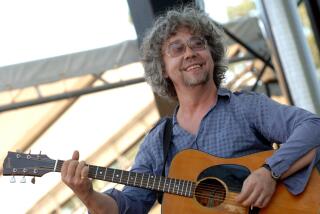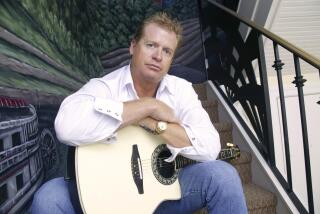Charlie Waller, 69; Musician Led Country Gentlemen Band
- Share via
For 47 years, Charlie Waller was the voice and the rhythmic soul of modern bluegrass music, singing and playing guitar with the Country Gentlemen, the influential, widely traveled band he helped found in Washington, D.C.
Waller died Aug. 18 of a heart attack at his home in Gordonsville, Va. He was 69.
During his career, he helped transport bluegrass from the front porches of the Appalachians to college campuses, concert halls and nightclubs.
In the 1960s, the Country Gentlemen led what was called the “new-grass revival,” recording albums that influenced younger musicians and pointing bluegrass in a more popular direction.
If the late Bill Monroe was considered the father of the traditional bluegrass sound, Waller and the Country Gentlemen captured the hearts of a new generation that had never listened to bluegrass before.
“[Waller] had one of the great voices in any kind of music,” said Len Holsclaw, who managed the Country Gentlemen from 1971 to 1998. “It stayed with him until the day he died.”
With Waller’s resonant baritone and John Duffey’s haunting tenor, the Country Gentlemen introduced elements of folk music, country and jazz to the blues and gospel roots of bluegrass. Waller was admitted to the International Bluegrass Music Assn.’s Hall of Honor in 1996, along with other members of the group. He was named contemporary bluegrass male vocalist of the year 10 times.
Waller recorded more than 50 albums with the Country Gentlemen, including “Songs of the American Spirit,” soon to be released. An article in Bluegrass Unlimited magazine in 2002 described the group as “one of the most popular, influential and important bluegrass bands to ever grace a stage or record a song.”
Waller was born in Joinerville, Texas, and moved with his family to Lake Charles, La., when he was 2 years old. In 1945, when he was 10, he moved with his mother to Washington, where she ran a boardinghouse. Inspired by country singer Hank Snow, he had his first paying job as a musician when he was 13.
He quit school in the eighth grade and worked at a gas station and a body shop while playing music at night. In 1955, he returned to Louisiana as a guitarist with Buzz Busby’s Bayou Boys, a bluegrass band that performed on the “Louisiana Hayride” radio show. As other Hayride performers, such as George Jones, Johnny Cash and Elvis Presley, found fame, Waller and Busby grew discouraged and decided to try their luck in Washington.
After Busby was injured in a car wreck, Waller hurriedly put together a group to keep from canceling a performance. The Country Gentlemen made their debut July 4, 1957, with Waller on guitar, Duffey on mandolin, Bill Emerson on banjo and Larry Leahy on bass.
The next year, when Eddie Adcock, who had been working with Monroe, took over on banjo, the band found its new sound. Besides the traditional music of hardscrabble Appalachia, the band did songs by the likes of Bob Dylan, Simon and Garfunkel, and Willie Nelson, but in its own acoustic, hard-charging style.
“The thing we had going for us was we didn’t care to sound like the rest,” Adcock has said. “We mixed in a few older country songs and folk songs; we did some jazz and movie themes.”
The band appeared at Carnegie Hall in New York and at festivals and colleges across the country. Their 1965 album, “Bringing Mary Home,” hit the country charts.
Duffey left the band in 1969, followed a year later by Adcock. But Waller persevered with new musicians and last year toured with his son, Randy.
Waller’s first marriage, to Mona Waller, ended in divorce. His second wife, Kathy Waller, died in the 1960s.
Besides his son Randy, he is survived by his wife of 25 years, Sachiko Waller; son Danny Graves; daughters Dori Lane and Mina Waller; five grandchildren; and two great-grandchildren.
More to Read
The biggest entertainment stories
Get our big stories about Hollywood, film, television, music, arts, culture and more right in your inbox as soon as they publish.
You may occasionally receive promotional content from the Los Angeles Times.










